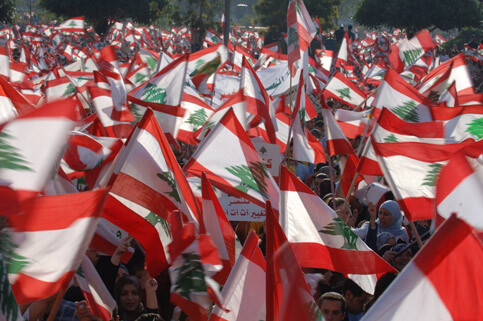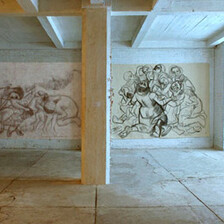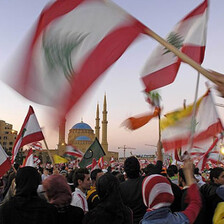Beirut 11 December 2006

Hundreds of thousands of opposition supporters wave Lebanese flags during a demonstration in a bid to bring down the government, Beirut, 1 December 2006. (Dina Debbas/IRIN)
Cradled in the beautiful southern mountains of Lebanon, a revolutionary impulse born of desparation created by Israeli terror and American oppression has turned into feverish nationalism. Here in Beirut yesterday, 10 December 2006, over a million people, perhaps two million, gathered in a historic first for Lebanon and possibly a historic percentage of any nation any one time any where.
It was a crowd in motion, literally. I watched the rivers of people weaving through the masses and the islands of those who stood still. Their shifting patterns, a natural motion, is a rare experience. Most people were very, very happy. They were kind and generous and chatty. They were anxious to talk to anyone like me who looked somewhat out of place—white hair, wandering all over alone, camera in hand photographing, body, clothing, and language from across the ocean. Someone bought me coffee and another gave me anise chewing gum. Any number of groups of family or friends would have adopted me. They wanted to explain Lebanon to me. Happy, generous, but determined, disciplined, and sure of good results.
Grassroots morality seems to surface and people are all anxious to explain that members of all religions are human. We are all alike, they said; it is only leaders and government and mistaken beliefs that create trouble. God made all of us alike, they assured me. One man came to me to show me a hand-lettered poster and requested that I photograph it. It was made by one of his relations and it beseeched Hariri’s son, a member of the Siniora group, to collaborate with them. The separation of church and state was being born and it was delicious to them, a road to a future, new Lebanon of equality for the oppressed.
Most people are politicized and are glad to explain their view of the world, which most often includes belief in one God that they all share. They are anxious to explain so that others would know their good will. It is not an attempt to convert me to a particular faith, only a desire to tell me that we are all alike no matter their or my religion. As they do so, they clearly are baffled about my religion—they can not identify me, but they remain loving, assured, wanting me to believe them.
Someone explained to me that the Palestinian organizations were asked not to join so that the event would not be accused of being Palestinian and would remain Lebanese. Oh, big wolf Palestine! But Palestine was under consideration and opposition leadership voiced wholehearted support. This individual further explained that the Siniora alliance now in power is offering citizenship to the Palestinians because they want to make peace with Israel.

Some people dancing the dabke in Shuhada Square on the night of December 5, 2006, just before the candlelight memorial for Ahmad Mahmoud, who was killed on his way home from the demonstration. (Samia A. Halaby)
Food is not a problem. Everyone brings food and offers it to those near them. Small vendors are everywhere selling fairly healthy food, like corn, beans, nuts, sesame bread, yogurt, water, and soda.
One man told us that Hezbollah tires their enemy with their patience. I have to admit they play their cards slowly, saving surprises, keeping plans secret, and holding back on their strongest card — Sayed Hassan Nasrallah.
Yesterday, for the historic gathering, four speakers were presented. One might have expected Nasrallah to speak, but rather the second in command did. Another speaker was Michelle Aoun, who is the second most popular leader of the opposition alliance. He calmly offered some serious suggestions to Siniora and company who are holding out in the government building next to the square. He told them that the demand of the opposition alliance to give them one-third-plus-one of the ministerial seats would end in three days. He also said that after three days, this offer will not be available and that the opposition would be demanding their complete removal, demanding an interim government and early elections. He also said that their patience is not endless and that there will be a moment where the barbed wire will not mean anything as the people will occupy the offices that belong to them.
After the amazing strength of the encampment and congregation in the heart of Beirut, the international bourgeoisie would surely be considering their options, considering how not to let the demands by the crowd outstrip demands made by the leadership. After hearing Aoun, I took a guess that the US would be thinking of how they can save the day by accepting the opposition and begin dividing, ruling, purchasing them one by one under the table. Today, those holding out in the government building began negotiating.
Today, at approximately 5 pm, I walked through the many tents at Shuhada and Solh Squares. The tents are increasing and people are camped out during the day sitting in circles, drumming, playing sheish-beish, smoking arguila and visiting. Some are winterizing their tents, putting up plywood. There is no doubt that this is the beginning of something very very serious. They are not dragging themselves home just because there are negotiations. They are staying the course until they get results.
Samia Halaby is a Palestinian artist based in the US.
Related Links





